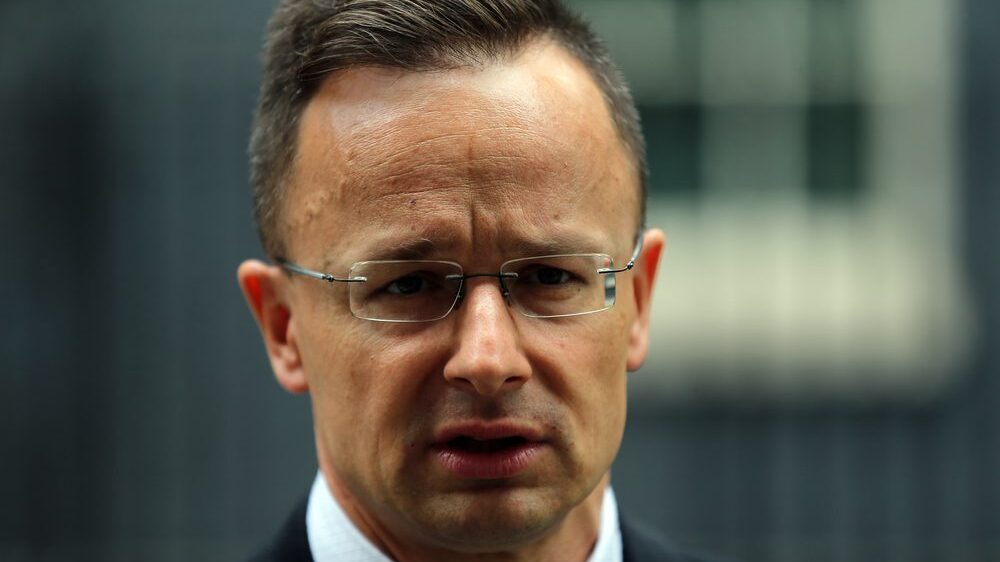
Hungarian Foreign Minister Péter Szijjártó.
Photo: I T S / Shutterstock.com
For Hungary, the tensions between national sovereignty and geopolitics are getting real.
In response to reports of leaked Pentagon documents alleging that Ukrainian President Volodymyr Zelensky last February suggested cutting off Hungary’s oil supplies through the Druzhba crude oil pipeline, Hungarian Foreign Minister Péter Szijjártó accused Kyiv of attacking his country’s national sovereignty. Neither Washington, nor Kyiv, nor Brussels have commented on the leaked documents.
Speaking at the Hungarian embassy in Vienna on May 17th, Szijjártó said:
We are all aware that Hungary is currently supplied with oil through this very pipeline. If no more oil were to come to Hungary through this pipeline, then Hungary’s oil supply simply would not be physically possible, not to mention that other countries are fundamentally dependent on the Druzhba Oil pipeline for their oil supplies. Therefore, such a threat is obviously against Hungary’s sovereignty because the security of the energy supply is a matter of sovereignty. Therefore, if someone calls for Hungary’s energy supply to be made impossible, they are in effect attacking Hungary’s sovereignty.
He also accused Ukraine of having become increasingly hostile to Hungary, citing Ukraine’s sanctions on the OTP bank and the closure of Hungarian-language secondary schools in Ukraine as of September. He reiterated that Hungary would block €500 million in military aid until Ukraine rescinded the sanctions on the bank, explaining that his country could not be expected to make any more economic sacrifices for a war it wasn’t responsible for.
In response to the bank sanctions and the secondary school issue, Hungary is shutting off the half a billion euros in aid to Ukraine from the European Peace Facility (EPF), calling for “guarantees” from Brussels that the Peace Facility maintain its “global” horizon and not earmark the money only for arms to Ukraine. Unofficially, the money is being held back in retaliation for Zelensky’s alleged plan to sabotage the Druzhba pipeline which would effectively ruin Hungary’s economy.
On the same day as Szijjártó’s comments, Zoltán Kovács, Hungary’s secretary of state for public diplomacy and relations, wrote on the Hungarian government’s website, About Hungary, criticising the European armament of Ukraine:
This is terrifying, as the European Union, created for common interests and peace in Europe, is consistently increasing the chances of Europe drifting to the brink of war, putting global interests before the interests of its own community, thereby causing further insecurity for the people of a Europe that have been already suffering the consequences of this senseless conflict.
Even without the revelations in the leaked documents, tensions between Ukraine and Hungary have been high.
Budapest has given humanitarian aid and taken in millions of Ukrainian refugees but has not provided weaponry and has only supported sanctions against Russia after carving out exceptions for Hungary. Its stance contrasts sharply with that of Poland, which called for sanctions against Russia and even sent fighter jets. Russia stopped sending oil to Poland through the Druzhba pipeline earlier this year.
The Druzhba pipeline, also called the Friendship Pipeline, is a Soviet-era construction and one of the longest oil pipelines in the world, spanning Asia and Europe, from Siberia to Germany over various branches. Each country owns and operates the sections that pass through its national territory. The branch that reaches Hungary connects through Ukraine, and the Ukrainian pipeline company Ukrtransnafta has been steadily increasing service fees for its Hungarian customer, the national energy company MOL.
Hungarian media are also reporting that on May 15th, Ukrtransnafta ‘s CEO Volodymyr Tszependa sent a note in Russian to MOL complaining that the Hungarian restrictions on Ukrainian agricultural products were too strict. In the leaked letter, Tszependa also reportedly said that EU Commission President Ursula von der Leyen had counselled him to simply stop supplying oil to Hungary if it remained inflexible on agricultural imports. Tszependa concluded the communique with assurances that he was willing to negotiate, but MOL considered the letter blackmail and has stopped negotiating directly with the Ukrainian pipeline company, according to Hungarian media.
Von der Leyen’s press office denied that the commission president had contact with the Ukrainian pipeline operator.
On May 19th, an op-ed in the Hungarian news outlet Origo called for no less than von der Leyen’s prosecution for both her silence in the face of Zelensky’s alleged threats against Hungarian oil supplies and for having “proposed to the Ukrainians to stop the Friendship oil pipeline.”
The op-ed also admitted that a certain amount of bad blood between Kyiv and Budapest has existed for decades. Approximately 150,000 ethnic Hungarians live in the Transcarpathia region of Ukraine near the Hungarian border. The Hungarian government helps support Hungarian-language schools in the area, which had been a point of tension between Budapest and Kyiv even before the war.
Tensions escalated in September 2022, when the Hungarian Prime Minister Viktor Orbán attended an event wearing a soccer scarf with a map of Greater Hungary, the Hungarian territory before the breakup of the Austro-Hungarian Empire at the end of World War I, which included parts of what are now Romania, Ukraine, Croatia, Serbia, and Slovakia.
The gesture perplexed and angered both ordinary Ukrainians and Kyiv, which demanded an apology. Romania, where 1.2 million ethnic Hungarians live, also demanded an explanation.
Orbán responded on Facebook that the Hungarian national soccer team was “the team of all Hungarians wherever they live.”
“Football is not politics. Let’s not see what is not there,” he said.
But everything is politics. Maintaining national sovereignty, which depends on energy supplies provided by two foreign nations—that also happen to be at war—is a political juggling act, if ever there was one.
